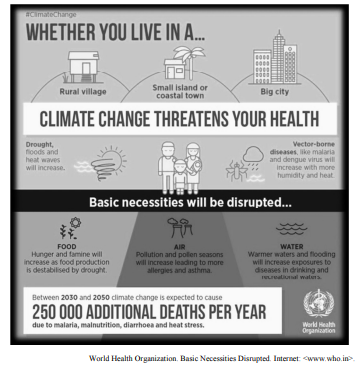Questões de Vestibular
Sobre verbos modais | modal verbs em inglês
Foram encontradas 66 questões
The modal verb “will” is used in most sentences of the infographic because the World Health Organization is showing the reader some projections about the future of the world regarding climate change.





The earliest experience of art must have been incantatory, magical.
Select the alternative that best presents its negative form.

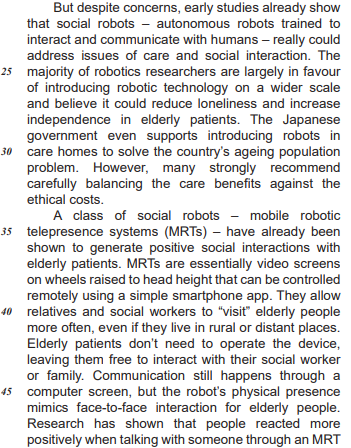
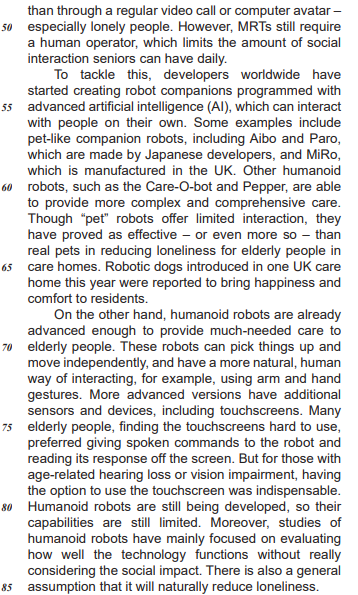
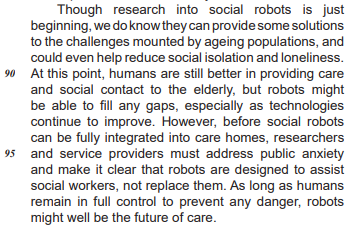
Available at:<https://www.independent.co.uk/life-style/gadgetsand-tech/features/robot-carer-elderly-people-lonelinessageing-population-care-homes-a8659801.html>. Retrieved on:
July 2, 2019. Adapted.






Available at: <http://www.bbc.com/culture/story/20180503-our-fi ction-
-addiction-why-humans-need-stories>. Retrieved on: 3 May 2018.
Adapted.
TEXTO 01
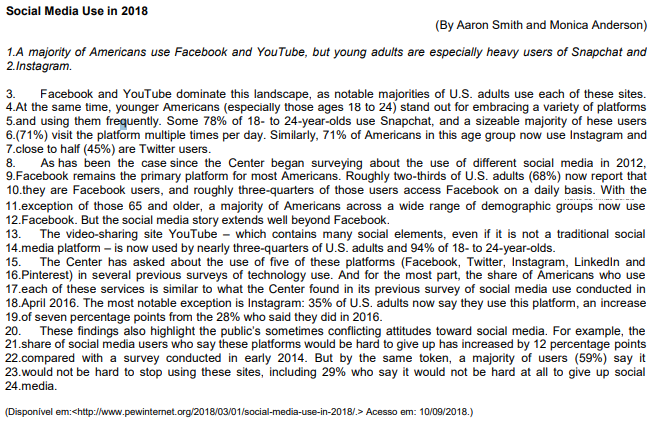
Responda a questão de acordo com o texto de Lauren Camera.
Supreme Court Expands Rights for Students with Disabilities
By Lauren Camera, Education Reporter - March 22, 2017. Adaptado.

In a unanimous decision with major implications for students with disabilities, the U.S. Supreme Court ruled Wednesday that schools must provide higher educational standards for children with special needs. Schools must do more than provide a ‘merely more than de minimis’ education for students with disabilities and instead must provide them with an opportunity to make "appropriately ambitious" progress in line with the federal education law.
“When all is said and done,” wrote Chief Justice John G. Roberts, “a student offered an education program providing a ‘merely more than de minimis’ progress from year to year can hardly be said to have been offered an education at all.” He continued, citing a 1982 Supreme Court ruling on special education: “For children with disabilities, receiving an instruction that aims so low would be equivalent to ‘sitting idly... awaiting the time when they were old enough to drop out.’”
There are roughly 6.4 million students with disabilities between ages 3 to 21, representing roughly 13 percent of all students, according to Institute for Education Statistics. Each year 300,000 of those students leave school and just 65 percent of students with disabilities complete high school.
The case which culminated in the Supreme Court decision originated with an autistic boy in Colorado named Endrew. His parents pulled him out of school in 5th grade because they disagreed with his individualized education plan. Under federal law, the Individuals with Disabilities Education Act (IDEA), schools must work with families to develop individualized learning plans for students with disabilities.
While Endrew had been making progress in the public schools, his parents felt his plan for that year simply replicated goals from years past. As a result, they enrolled him in a private school where, they argued, Endrew made academic and social progress.
Seeking tuition reimbursement*, they filed a complaint with the state’s department of education in which they argued that Endrew had been denied a "free appropriate public education". The school district won the suit, and when his parents filed a lawsuit in federal district court, the judge also sided with the school district. In the Supreme Court case, Endrew and his family asked for clarification about the type of education benefits the federal law requires of schools, specifically, whether it requires ‘merely more than de minimis’, or something greater.
“The IDEA demands more,” Roberts wrote in the opinion. “It requires an educational program reasonably calculated to enable a child to make progress appropriate in light of the child’s circumstances.”
*reimbursement – a sum paid to cover money that has been spent or lost.
In:<https://www.usnews.com/news/education-news/articles/2017-03-22/supreme-court-expands-rights-for-students-with-disabilities>

In today’s political climate, it sometimes feels like we can’t even agree on basic facts. We bombard each other with statistics and figures, hoping that more data will make a difference. A progressive person might show you the same climate change graphs over and over while a conservative person might point to the trillions of dollars of growing national debt. We’re left wondering, “Why can’t they just see? It’s so obvious!”
Certain myths are so pervasive that no matter how many experts disprove them, they only seem to grow in popularity. There’s no shortage of serious studies showing no link between autism and vaccines, for example, but these are no match for an emotional appeal to parents worried for their young children.
Tali Sharot, a cognitive neuroscientist at University College London, studies how our minds work and how we process new information. In her upcoming book, The Influential Mind, she explores why we ignore facts and how we can get people to actually listen to the truth. Tali shows that we’re open to new information – but only if it confirms our existing beliefs. We find ways to ignore facts that challenge our ideals. And as neuroscientist Bahador Bahrami and colleagues have found, we weigh all opinions as equally valid, regardless of expertise.
So, having the data on your side is not always enough. For better or for worse, Sharot says, emotions may be the key to changing minds.
(Shankar Vedantam. www.npr.org. Adaptado.)
Opportunity Cost
This phenomenon goes by the name of ‘opportunity cost,’ since by not investing in more equipment and a more rigid production flow, the company is forgoing the opportunity to earn increased profits. These costs are every bite as real as the payment of dollars out-of-pocket.
This notion _______ opportunity cost can be reinforced _________ a famous saying ______ Benjamin Franklin, no slouch himself _________ operations management. To make the point, however, we must make a brief excursion into logic. One truth of logic is the validity of the so-called contrapositive, which says simply that if the statement “If A, then B” is true, then it is also true that “If not B, then not A.” That is, of every time A occurs B follows, then we can be sure that if B does not occur, then A did not occur as well. Enough logic then, and back to Ben Franklin.
One of his Poor Richard sayings is that “A penny saved is a penny earned.” We have all recognized the truth of that since childhood, but I assert that by this saying Ben showed us he knows everything about opportunity cost. After all, what is the contrapositive of “A penny not earned is a penny not saved (i.e., a penny sent). All we are saying by this notion of opportunity cost is that “a penny not earned (an opportunity forgone) is a penny spent.” We shall often have occasion to consider opportunity costs, in analyzing and deciding various operations issues.
SCHMENNER, Roger W. Production/Operations Management. 5th
Edition. Prentice-Hall, 1993.
Re-Planting a Forest, One Drone at a Time
That funny little buzz you hear in the forest may not just be the hum of summer insects. In the near future it could be a small fleet of drones, coming to replant and restore forests that have been stripped of trees by industrial-scale deforestation. It’s all part of an ambitious plan by BioCarbon Engineering, a U.K.-based startup on a global mission to battle widespread clear-cutting, which strips more than 26 billion trees off the planet each year. CEO Lauren Fletcher, who spent 20 years as an engineer with NASA, says the only way to fight industrial-scale deforestation is with industrial-scale reforestation. Their idea: plant 1 billion trees a year. The first targets are in South Africa and the Amazonian jungles, both of which have suffered from widespread forest eradication.
BioCarbon’s reforestation scheme is simple and efficient. Here’s a quick look at how it plans to deploy its drone fleet:
1 Do a 3-D aerial survey. First, drones are sent to fly over a potential planting zone, snapping photos that create 3-D maps of the area to be reforested. The number of drones will vary depending up on the size of the seeding.
2 Create a seeding plan. Once all that terrain data has been analyzed, it then generates a seeding pattern that best suits the terrain.
3 Load the seed pods. The drones, which are equipped with guidance and control software, carry pressurized canisters of seed pods with germinated seeds immersed in a nutrient-rich gel.
4 Hover and plant. Flying at a height of 1 or 2 meters, the drones follow the planting patterns, firing the biodegradable seed pods down to the ground. The pods break open upon impact, allowing the germinated seed a chance to take root.
5 Monitor growth. After planting, the drones do low-level flights to assess the health of the sprouts and saplings.
Such “precision forestry,” as BioCarbon calls it, is extremely efficient. A farmer might hand plant as many as 3,000 seeds a day; Fletcher says his drones can drop up to 36,000 seed pods daily, often in areas where a human can’t reach. Working with local ecologists, BioCarbon will use the drones to spread a variety of tree species, as well as microorganisms and fungi designed to improve the soil quality. “The central focus is ecosystem restoration,” Fletcher says.
On a planetary climatological scale, Morton notes that “tropical deforestation plays a big role in global climate cycles,” claiming the accelerated pace of cutting and burning of forests accounted for 20 percent of greenhouse gas emissions in the 1990s. Fletcher and his team want to help reverse that trend. “By planting at the scale we’re looking at,” he says, “we can make a real longterm impact. We hope to do a lot of good in the world.”
(Adapted from https://www.wired.com/brandlab/2015/07/re-planting-forest-one-drone-time/. Access on 22/8/2017)
